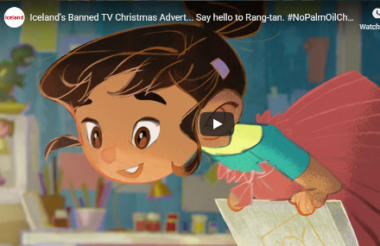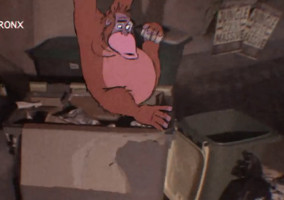In the summer Greenpeace shared a video called Rang-tan: the story of dirty palm oil, highlighting the plight of orangutans who have been made homeless by deforestation. It has been viewed 280,000 times on the campaigning group’s YouTube page and 636,000 people have signed its petition.
Then last week the supermarket Iceland posted the same video, with the message that it had hoped (with permission from Greenpeace) to use it as its Christmas campaign. However it said the advert had been banned by Clearcast, which passes adverts as fit for broadcast on TV, for being “too political”.
The story of the ban went viral. Iceland's YouTube video has been viewed over 4.1m times and a petition to overturn the ban has reached 860,000 signatories. The advert has potentially achieved more reach than it would have done if it had gone out as expected.
Full disclosure: I am a big fan of orangutans; I quite literally have the T-shirt. But the main issue here for charities is about where the lines are drawn about campaigning, lobbying, political activity and free speech.
In case you haven’t seen it, here’s the advert in question.
Why was the advert banned?
Iceland says its advert was banned “on grounds of being seen to support a political issue”. This is because Greenpeace is not a charity. It's a lobby group which seeks to change the law on the environment. Although I think the sector claims Greenpeace as its own.
Iceland has committed to removing palm oil from all its own-label products because the production of palm oil is one of the main reasons for deforestation, and the destruction of the habit where orangutans live. The retailer had hoped to raise awareness and had committed £500,000 in advertising spend to do so.
Its managing director, Richard Walker, declared: “This year we were keen to do something different with our much anticipated Christmas advert. The culmination of our palm oil project is offering our customers the choice of an orangutan friendly Christmas, and we wanted to reflect this in our advertising.”
In the past John Lewis has used its Christmas advert to support a range of causes including an emergency appeal from a Save the Children emergency relief appeal, to Age UK’s loneliness at Christmas as well as a couple of animal charities.
So it seems odd for another retailer to be punished for trying to do something similar.
This should also set alarm bells ringing for charities and campaigners who might be thinking of producing television adverts.
Yes, the orangutan film is political, but it’s not party political and is no more controversial than a WWF advert from last Christmas about elephant poaching.
The other side of the story
Clearcast, the body which did not technically ban the advert, but did refuse to approve for broadcast. Semantics really.
Chris Mundy, managing director of Clearcast, wrote that there has been a “misunderstanding”.
He agrees that the film raises “an important issue” but because it is a Greenpeace film it could not be cleared, even though the Greenpeace branding was removed, because “Greenpeace have not yet demonstrated to Clearcast or the broadcasters that they are not a political advertiser”.
This is actually a more dangerous precedent. Because now the burden of proof is now on lobbying groups to prove that they aren't political. And proving a negative is pretty hard.
It seems a ridiculous distinction. Iceland wanted to be open that this was Greenpeace's advert. So did Greenpeace. No one was trying to hide anything. Should we be banning content not because of what it says, but because of who says it?
Should we really be preventing organisations from spreading a message, if they're open about their funding and purpose, and it would be fine if someone else did it?
Would it have been ok if the advert had been produced by Greenpeace’s charity wing? Or would it have been ok if such as this one from the Sumatran Organgutan Society, which has a strikingly similar message?
Are there any winners
The real cynics out there suggest that Iceland wanted to get the advert banned. It resulted in a lot of social media discussion and media coverage, which it certainly wouldn’t have got if it was broadcast on TV a couple of times.
I’m not sure whether Iceland, Greenpeace or the regulator can claim victory, though. In the end it's drawn attention to the plight of the orangutans, which is a good thing, but the process has been poor.
This episode highlights, again, that laws around campaigning, lobbying and charity are not fit for how people interact today and are in desperate need of reform.
Greenpeace, bizarrely, has been almost silent on the controversy – simply sharing its video again. Iceland has reached a new audience on social media, but will they lose out by not having a television advert in the lead-up to the busy Christmas period. The odd thing is that a huge campaigning opportunity is in danger of being lost.
While this may be an argument not involving any actual charities, it opens up debates around the nature of political campaigning and lobbying. Anything that makes this harder should be of concern to the wider sector.
|










